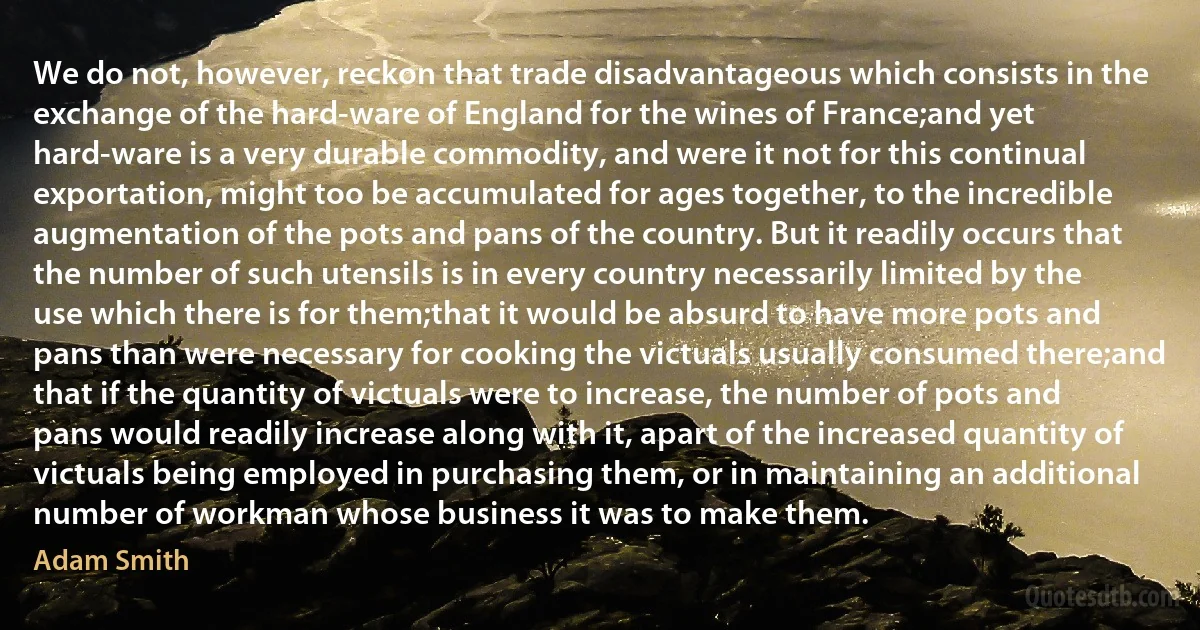
We do not, however, reckon that trade disadvantageous which consists in the exchange of the hard-ware of England for the wines of France;and yet hard-ware is a very durable commodity, and were it not for this continual exportation, might too be accumulated for ages together, to the incredible augmentation of the pots and pans of the country. But it readily occurs that the number of such utensils is in every country necessarily limited by the use which there is for them;that it would be absurd to have more pots and pans than were necessary for cooking the victuals usually consumed there;and that if the quantity of victuals were to increase, the number of pots and pans would readily increase along with it, apart of the increased quantity of victuals being employed in purchasing them, or in maintaining an additional number of workman whose business it was to make them.
Adam SmithRelated topics
additional apart augmentation business cooking country increase limited maintaining might necessary number purchasing trade use workman yet potsRelated quotes
There is the name and the thing: the name is a voice which denotes and signifies the thing; the name is no part of the thing, nor of the substance; 'tis a foreign piece joined to the thing, and outside it. God, who is all fulness in Himself and the height of all perfection, cannot augment or add anything to Himself within; but His name may be augmented and increased by the blessing and praise we attribute to His exterior works: which praise, seeing we cannot incorporate it in Him, forasmuch as He can have no accession of good, we attribute to His name, which is the part out of Him that is nearest to us. Thus is it that to God alone glory and honour appertain; and there is nothing so remote from reason as that we should go in quest of it for ourselves; for, being indigent and necessitous within, our essence being imperfect, and having continual need of amelioration, 'tis to that we ought to employ all our endeavour.

Michel de Montaigne
Development means a capacity for self-sustaining growth. It means that an economy must register advances which in turn will promote further progress. The loss of industry and skill in Africa was extremely small, if we measure it from the viewpoint of modern scientific achievements or even by standards of England in the late eighteenth century. However, it must be borne in mind that to be held back at one stage means that it is impossible to go on to a further stage. When a person was forced to leave school after only two years of primary school education, it is no reflection on him that he is academically and intellectually less developed than someone who had the opportunity to be schooled right through to university level. What Africa experienced in the early centuries of trade was precisely a loss of development opportunity, and this is of the greatest importance.

Walter Rodney
Decidedly, we are at cross-purposes. What's all this you tell [from England] about the modern movement, commercialism, etc, etc? It bears no relation to our concept of art, at any rate here... That is where the error lies. Trade serves those up to us as readily as anything else; so it is no use. Wouldn't it be better to steep ourselves in genuine nature again? I do not consider in the least that we are making a mistake, that we should turn to the steam-engine and follow the general public [ William Morris, the more traditional artist became very popular those days]... No, a thousand times no! We are here to point the way.... the remedy is to be found in nature, more than ever. Let us follow what we consider to be the proper aim, we shall see who is right. After all, money is a fragile thing; let us earn some of it, since we must, but let us keep to our role.

Camille Pissarro
In March 1879 Clifford died at Madeira; six years afterwards a posthumous work is for the first time placed before the public. ...The original work as planned by Clifford was to have been entitled The First Principles of the Mathematical Sciences Explained to the Non-Mathematical, and to have contained six chapters, on Number, Space, Quantity, Position, Motion, and Mass respectively. Of the projected work Clifford in the year 1875 dictated the chapters on Number and Space completely, the first portion of the chapter on Quantity, and somewhat later nearly the entire chapter on Motion. The first two chapters were afterwards seen by him in proof, but never finally revised. Shortly before his death he expressed a wish that the book should only be published after very careful revision and that its title should be changed to The Common Sense of the Exact Sciences.

William Kingdon Clifford
I gave up on this stuff. I gave up on my species and ... I gave up on my countrymen. Because I think we squandered great gifts. I think humans were given great great gifts: walking upright, binocular vision, opposable thumb, large brain ... We grew. We had great gifts, and we gave it all up for both money and God ... We gave it all up to superstition, primitive superstition, primitive shit ... Invisible man in the sky, looking down, keeping track of what we do, make sure we don't do the wrong thing, if we do, he puts us in hell, where we burn forever. That kind of shit is very limiting for this brain we have. So we keep ourselves limited. And then we want a toy and a gizmo and gold and we want shiny things, and we want something to plug in that will make big big big things for us... And all that shit is nothing! It's nothing.

George Carlin
